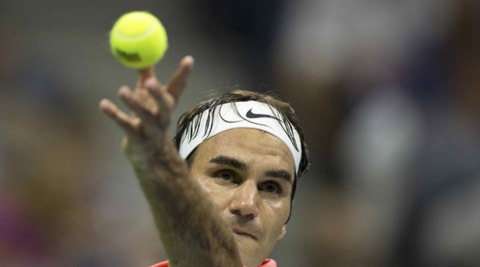Opinion Federer and me
What Roger’s arrested decline teaches us about fandom

 Roger Federer is two wins away from his 18th Grand Slam. (Source: Reuters)
Roger Federer is two wins away from his 18th Grand Slam. (Source: Reuters)
As the US Open semifinal between Roger Federer and compatriot Stan Wawrinka approaches, I find myself convulsed with nervous tension. These feelings are not unfamiliar to any true sport obsessive, and are not new to me — in the past, I have experienced similar cocktails of apprehension and anticipation each time Sachin Tendulkar padded up, or Michael Schumacher queued up on the grid.
My engagement with sport is a story of fandom. I am no fair-weather fan and have soldiered on, offering support through the troughs and peaks of my moods and fortunes, which I believe coincided with those of my idols. But, with the exception of the Indian cricket team — a choice helped along by a hefty dose of patriotism — I have gravitated towards not just winners, but the most dominant competitors in their areas. As a little girl, I was all about Steffi Graf.
Then, like any good Indian and much to the delight of my father, I was converted to cricket, which meant long years as a frustrated Tendulkar fan, given that he seemed destined to be perpetually let down by the mediocrity of the team around him. At Eden Gardens that terrible afternoon in 1996, I cried my adolescent heart out. And cheered almost as wildly some 15 years later, when he finally lifted the World Cup. In the middle, though, despite a mild flirtation with club football and the charms of David Beckham/ Raúl, I flicked over to the 1997 Monaco Grand Prix, and saw a man named Schumacher drive circles around the rest of the field, seemingly effortlessly, and was instantly hooked.
Nick Hornby, devoted Arsenal fanatic, writes in his insightful tale of sporting obsession, Fever Pitch, of how he fell in love with football “suddenly, inexplicably, uncritically, giving no thought to the pain or disruption it would bring with it”. Later, he describes how family and friends became resigned to scheduling events around a match and wearily accepting an absence from a social occasion. Through high school, college and even grad school, I was the same — but my tyrant of choice was Formula One, or more accurately, Schumacher. Oh, I followed other sports — in the early 2000s, for instance, I saw the new enfant terrible of tennis, one Roger Federer, and Manchester United even earlier — but Schumi inspired a hitherto unknown level of emotional (and material) investment.
So when he retired in 2006, battling for the title till the very end but cruelly denied by an engine failure, I was devastated.
Grieving and desperately on the lookout for a rebound to fill the void, I found Federer. Here was this tennis player who seemed to glide, skip and float across courts, a supreme aesthete who could craft points of such physics-defying elegance and beauty that, as the canonical text of Federer fandom by David Foster Wallace so eloquently described it, one’s “jaw drops and eyes protrude and sounds are made that bring spouses in from other rooms to see if you’re OK”.
The ecstasy of this experience was only intensified by the sheer physical presence of his great nemesis, Rafael Nadal, who seemed to be the anti-Federer: all power and brute strength, no style and most definitely no poetry.
And for the most part, Federer didn’t disappoint. The wins flowed from his racket as fluently as that great liquid whip of a forehand, even as his stranglehold at the top was increasingly challenged by Nadal and Novak Djokovic.
Then he lost at Wimbledon, the Mecca of tennis and his favourite, to Nadal in a match that is a contender for the greatest ever, and I mourned with him, deeply. All of us fans believe our grief is somehow more authentic than that of the others who profess to share our devotion, and I am no exception. Inevitably, Federer slowed down, age and talented competition catching up with him and after a miserable 2013, his seemed to be that saddest of stories, of a once-great career in terminal decline. The gloom of his impending failure cast a pall over everything I did, and I wished he would retire while a modicum of dignity still remained.
But another Federer moment was in store. Somehow flouting the rules of time and biology, he reversed the slide and started competing for majors again. At 34, Federer is playing his 38th grand slam semifinal, still unveiling new shots and improving his game. It is a late-career surge sculpted with the same intricate artistry he deploys on court. Time seems to have forgotten him, and his unexpected renaissance has taken his fans to an unknown, strange place. His days of imperial dominance behind him, he can still be counted on to win titles, if not majors. What does this glorious epilogue mean for a fan accustomed to invincibility?
It means that even though it hurts to see him beaten, there is an exhilaration in just seeing him play, unleashing a few of those regal backhands and clever drop shots. It means that nerves apart, you celebrate any opportunity to see him use his preternatural talent to dismiss opponents, even if he is more prone to losing now. It means disregarding a sporting culture obsessed with preserving legacies and going out on top. It means, finally, fandom as a purely joyous experience, devoid of the toxic sense of entitlement that can leech enjoyment from the simple act of watching genius at work.
yamini.lohia@expressindia.com


